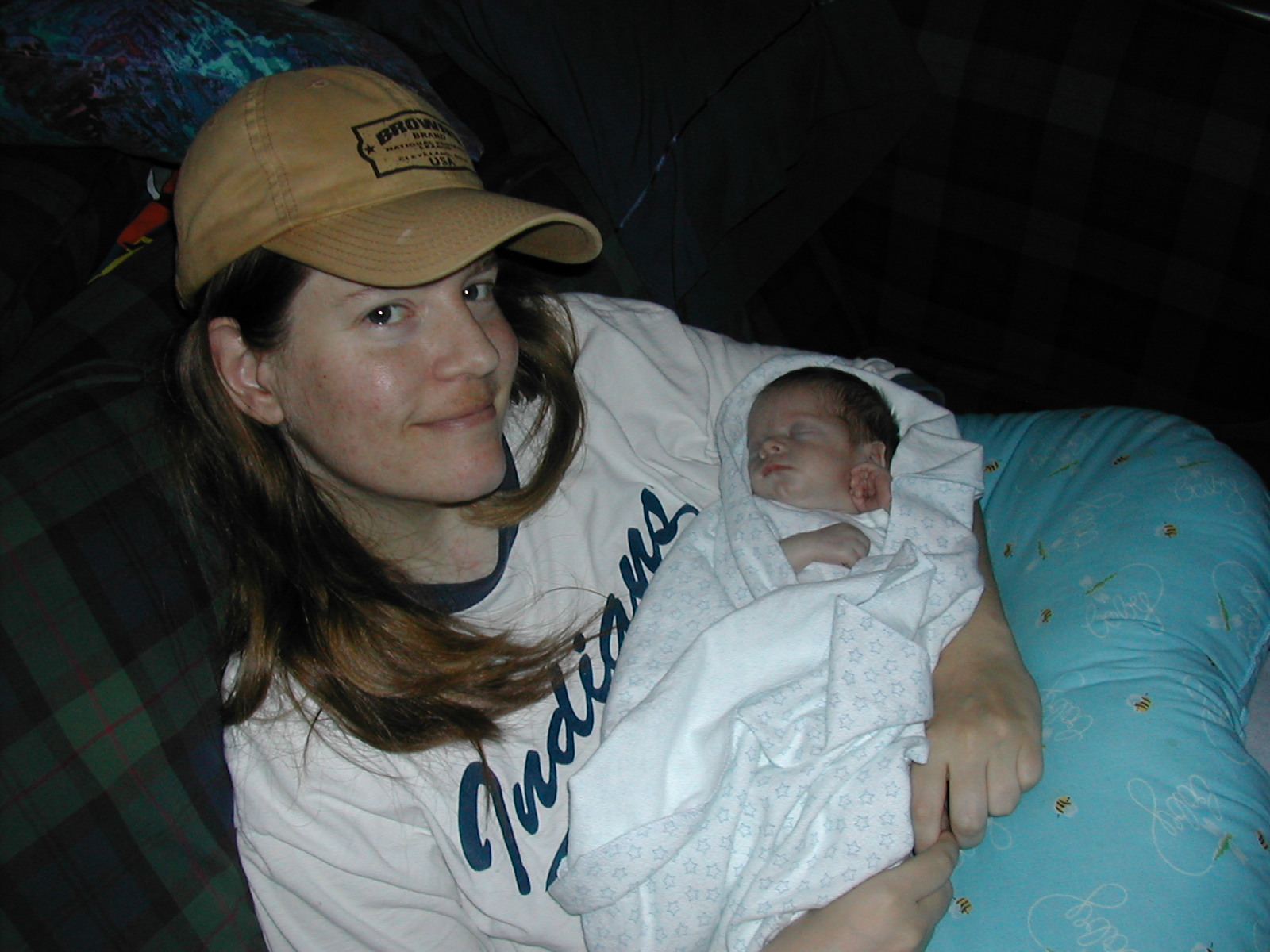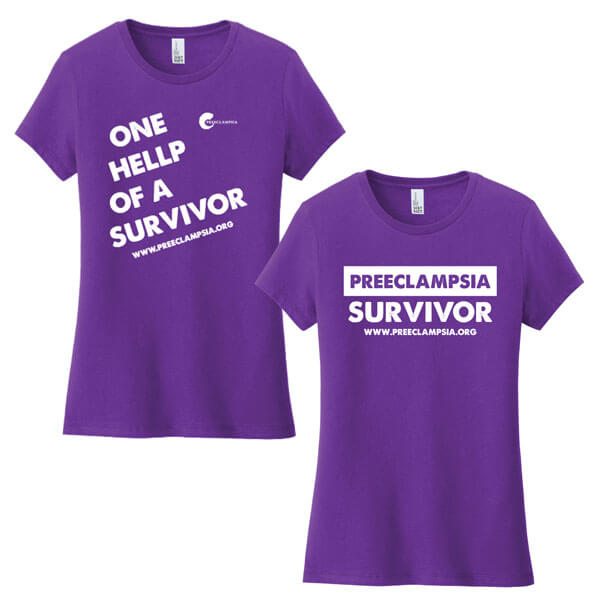
Premature Birth Creates Emotional Challenges
During the fall each year, many conversations happen around premature birth and the neonatal intensive care unit (NICU) experience, as September is NICU Awareness Month and November is Prematurity Awareness Month. In the United States, about 380,000 babies are born prematurely each year. The preterm birth rate (the percent of babies born before 37 weeks each year) is 9.8 percent in the United States. This means 1 in 10 babies is born too soon. The U.S. preterm birth rate is among the worst of high-resource nations. (source: March of Dimes)
Preeclampsia is a leading known cause of premature birth, contributing to about 1/5 of all premature deliveries. For many members of our community, time spent at the side of an incubator is a major part of their preeclampsia story. Premature birth is also a leading cause of infant loss, especially where preeclampsia is concerned.

"The hospital where he was born - the closest one to our house - did not have a NICU," she explained. "He was transferred to a larger hospital about 15 miles down the highway, making a brief stop by my ICU bed before being taken in an incubator to the waiting ambulance."
That brief stop was the first and last time that Jennifer saw her newborn son during her eight-day hospital stay.
(See our "Share Your Story" section to read other stories from our NICU/preeclampsia community.)
Facing Separation
When a mother develops preeclampsia before her baby is mature, doctors must weigh the relative risks to the mother and baby of continuing the pregnancy against the risks to the baby of a preterm birth. Some measures, such as steroid shots to promote fetal lung development, are used to achieve better outcomes for premature infants, but there are no guarantees. When preeclampsia hits early, the result can be a very sick mother and an extremely premature baby.
As with Jennifer's experience, treatments required for both the mother and the baby can require them to be apart, sometimes even at different hospitals. Mothers recovering from preeclampsia, eclampsia, and HELLP syndrome may need oxygen, magnesium sulfate to prevent seizures, antihypertensive medications to bring down their blood pressure, blood product transfusions, and other treatments that require increased healthcare provider supervision. Premature babies face challenges around organ development, body temperature regulations, and in many cases with preeclampsia, interuterine growth restriction (IUGR) that may have caused them to be small for gestational age (SGA).
For HELLP syndrome survivor Julie Lesh, her 25 week delivery meant that her daughter was only 1 lb, 10 oz. While Julie slowly recovered, her tiny daughter's life hung in the balance. Lesh's husband had to handle "pretty much everything" at home while also balancing time spent at both bedsides. It's a common experience for partners of preeclampsia survivors.
Of her own experience, Carney recounts, "The hospital staff did everything they could to help facilitate communication with the NICU, but talking to the nurses on the phone was a poor substitute for actually being there. The separation was jarring and made the recovery process much harder than it probably would have been."
Complications for Baby and Mom
Tragically, complications in the NICU are common. It's important to recognize that premature delivery is not a linear path. Diseases such as necrotizing enterocolitis (NEC), retinopathy of prematurity (ROP), brain bleeds, and acute respiratory distress syndrome (ARDS) can develop and threaten the life and health of the infant. Much of what happens to the infant is out of the parents' control. It is hardly surprising that studies have shown that PTSD is fairly common among parents with children in the NICU.
The Preeclampsia Foundation partnered with the National Perinatal Association to help develop their Interdisciplinary Recommendations for The Psychosocial Support of NICU Parents to emphasize that the NICU experience is more than a physical one.
Any new mother is susceptible to developing postpartum depression, regardless of the circumstances of the birth. The additional trauma of a birth complication, a premature infant, and the atmosphere of a NICU produces heightened emotions and intensity, contributing to feelings of depression. Parents deal with the immediate problems surrounding their own children, while also being close witnesses to the trauma of other parents and families. When the otherwise constant beeping of machines is pierced by an alarm indicating that an infant has stopped breathing, the whole team of specialists in the NICU jumps into action. These moments happen without warning. Sometimes it is your own child. Sometimes it's the child of a parent you have gotten to know during your stay. It's never easy to witness and it happens often.
The needs of premature infants following their release from the NICU can also have a negative impact on the mental health of the mothers. Eclampsia survivor Becky Sloan, recalls her experience with her first son. After a 30-day stay in the NICU, "The threat of RSV [respiratory syncytial virus] kept me secluded from friends, family, or even a walk around the neighborhood." RSV is a virus that normally causes mild colds in most people, but can develop into pneumonia in preemies. The enforced three-month isolation and her son's "stomach pain, sleeping issues, and other premature side effects" contributed to Sloan's postpartum depression. Her experience with eclampsia also played a part, "I tried [unsuccessfully] to psych myself into believing that because I survived and our son survived, I should be happy."
Check out our Resources for Coping with Birth Trauma
Reunion Can Be Difficult
The transition from ICU patient to NICU parent is a difficult one. After recovering from the trauma of a rough birth, parents are thrown directly onto the NICU roller coaster. Parents must learn a whole new vocabulary. The moments that aren't spent in suspended animation, sitting and waiting, are largely filled with incomprehensible terror.
Babies born extremely premature often experience prolonged stays in the NICU and need multiple interventions to survive. Julie Lesh's daughter stayed in the NICU for 90 days. Julie noted that after her own release, "it became a case of ignoring my own health issues to concentrate on [her daughter] and her struggles. Her team would remind me to take my medication and check my blood pressure."
Therapists who specialize in perinatal mood disorders and perinatal loss recommend that patients take it slow and use mindfulness to check in on their own mental wellbeing. It's also important to recognize that your partner may process their grief over the loss of the "expected" pregnancy differently.
"I tell all of my clients, you can be exceedingly happy that your baby is here and still upset about how the baby got here," says Dr. Lorissa Eichenberger, pre-eminent birth trauma therapist and friend of the Foundation. "You can feel both, it is OK.... You can be happy the baby is here and still be angry about how the birth happened. That is part of the big platform of spreading awareness around birth trauma.” (Source: Center for Postpartum Health blog)
Moving Forward
So how can parents of premature babies move forward and process their experience in a way that promotes healing?
"There is nothing I can do to change the circumstances of my son's birth, our eight days of separation, or my postpartum depression," added Jennifer Carney. "This is why I share my story and why I sought out the Preeclampsia Foundation. For me awareness is as much about not feeling alone in my experience as it is about informing those who have not yet joined our ranks."
Many patients begin with telling their story in our "Share Your Stories" section of the website, then finding a way to get involved as a volunteer, patient advocate, or Foundation supporter.
Editorial note: This article was originally written in November 2012 and updated in September 2021.
It is our collective voice that reduces isolation for others, raises awareness and improves healthcare practices. Let's raise up our voices so more women know about preeclampsia and HELLP syndrome and less women have adverse outcomes!
Related Articles

Doulas can help bridge the gap for any mom, but especially those most vulnerable to maternal illness and death.

Stories of our brave women and families who have been affected by preeclampsia and HELLP syndrome. Please note that due to a technical issue, we are currently fixing the images on this page.

What is Preeclampsia? Preeclampsia is a disorder that occurs only during pregnancy and the postpartum period and affects both the mother and the unborn baby. Affecting at least 5-8% of all p...

Birth Trauma Resources Between 25 and 34 percent of women report that their births were traumatic. A traumatic birth experience is defined by circumstances in which the individual patient bel...

Resultados de varios estudios apoyan la hipótesis de que el estrés causado por un embarazo y parto traumáticos puede en muchas ocasiones anular la habilidad de salir adelante emoc...

As an advocate who served on the planning committee for the Foundation’s Chicago Promise Walk and 5K Run for numerous years and currently serves on the Patient Advisory Council, Jasmine Mago is...

As a preeclampsia survivor in our PF community, you are probably well-aware that you have a higher risk for various forms of heart disease than our “normal” pregnancy peers. As one survivo...

For those who have experienced the loss of their expected pregnancy experience, the end-of-year holiday season can be a time of grieving. Grief can manifest as anger, sadness, irritability, frustratio...

I met some amazing people while on the Re-Connect Tour 2022 this summer and came away with new friendships, renewed energy, and lasting memories. Early into the two-month tour I began thinking a lot...



